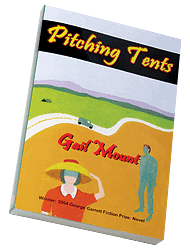Review by Christopher Dow
Pugnacious and bitter Wayman Scott is a small-town artist with more talent than good sense. His studio is an old milk truck; his mother dislikes him; the citizens of Burro, Texas, barely tolerate him; and he’s been married—and divorced—six times. Now, with his life winding down, apparently with no hope of release for his free spirit, he suddenly finds himself in love with vivacious, untamed, and enigmatic Vida Singer. So what if he’s 65, she’s 15 years older, and a whole lifetime has passed since he last saw her? When she was his grade school teacher, Vida taught him to draw.
The story of Wayman’s wild courtship of the unconventional Vida and his coming to terms with age and life are the subjects of the picaresque Pitching Tents (Texas Review Press, 2005), by Gail Mount. The novel was the winner of the 2004 George Garrett Fiction Prize, and it’s easy to see how its funny and touching story, earthy characters, and humorously indelicate language could have seduced the prize jury. What really gives the novel substance, though, is how it thematically juxtaposes the ways in which people make decisions and carry out actions with the sometimes unforeseen and unintended consequences those decisions and actions may have.
Wayman seems content with his own follies and foibles, but not his circumstances. He thinks he’s ready for some momentous change in his life, but he’s not quite prepared for aggravating and exasperating but remarkable Vida. On their first “date,” she takes him home to show him the body of her just-deceased roommate, Mad Betty. Once Burro’s outspoken female doctor before becoming too unconventional for the town’s more upright citizens, Mad Betty spent her last years as a recluse and mentor to Vida. In her final moments, Mad Betty crawled stark naked onto the kitchen table to die just to offend her despised nephew, who is the corrupt county judge.
Immediately after Mad Betty’s funeral, a terrible storm hits, leaving much of Burro a disaster zone—symbolizing the way Vida’s energy and enthusiasm will soon have much of Burro up in arms and Wayman almost desperately trying to live out his impulses. In short order, he phones in a bomb threat to his mother’s nursing home, provokes the town preacher and county judge, skinny dips in the local swimming hole, engages in public drunken revelry, and finds himself entangled in an affair with a stripper.
But Wayman’s newfound zest for life also results in a definite upswing in his art, and his paintings become hot. The owner of the gallery where he sells his work insists that he have a show, and all hell breaks loose. Before Wayman can comprehend—much less deal with—the situation, his problems take a serious turn after he is accused of murdering the stripper’s abusive husband. Worse, at the trial, all his erratic behavior during the preceding months is held up to public scrutiny. “People don’t mind eccentrics up to a point,” the friendly sheriff warns Wayman. “But if they think the eccentric has quit being an eccentric and becomes a menace, that’s a different ball of wax.”
The only element of Pitching Tents more vivid than the small-town Texas landscape is the cast of characters that inhabit it. You can’t second-guess the crazy folks in this novel, and wondering just what they’re going to do next keeps the pages turning. It would be easy to see the novel as an examination of social conventions, showing how anyone considered to be an outsider must deal with innuendo, slander, and accusation until their lives become, if not mythic, then at least the subject of folklore. But giving a small town the send-up is just the surface of Pitching Tents. Beneath is the more important current of Wayman’s rekindled fascination with life characterized by Vida.
The writing is sarcastic and snappy, and Mount’s natural language flows like a reliable stream across a landscape that needs a nurturing presence. It’s an easy read, but just as Wayman is continually revitalized by the life-giving flow represented by Vida, the book’s thematic subtext keeps slipping in there with just the right amount of spice to bring out the flavor of the characters and incidents.
There’s wisdom in Pitching Tents, disguised behind its whimsical befuddlement and bemused jaundice. Comic and playful? Yes. Quirky? Definitely. This is Texas gothic at its best and a fun and rewarding read.
Mount’s work has appeared in the Texas Observer; the Texas Journal of Ideas, History, and Culture; and the Utne Reader, and his plays The Offing and Vicissitudes have had readings in Houston and New York.
This review originally was published in the spring 2006 issue of Sallyport: The Magazine of Rice University.

